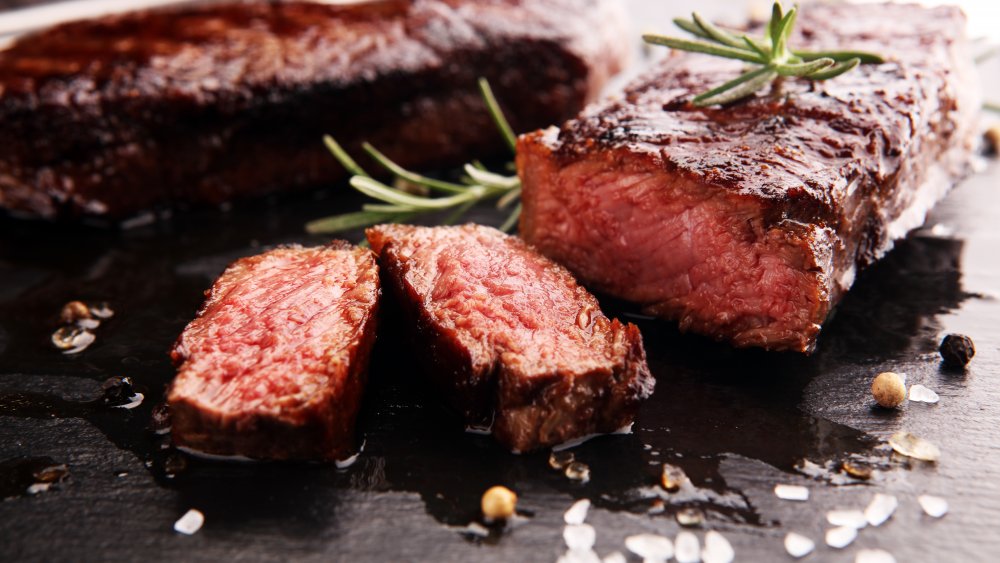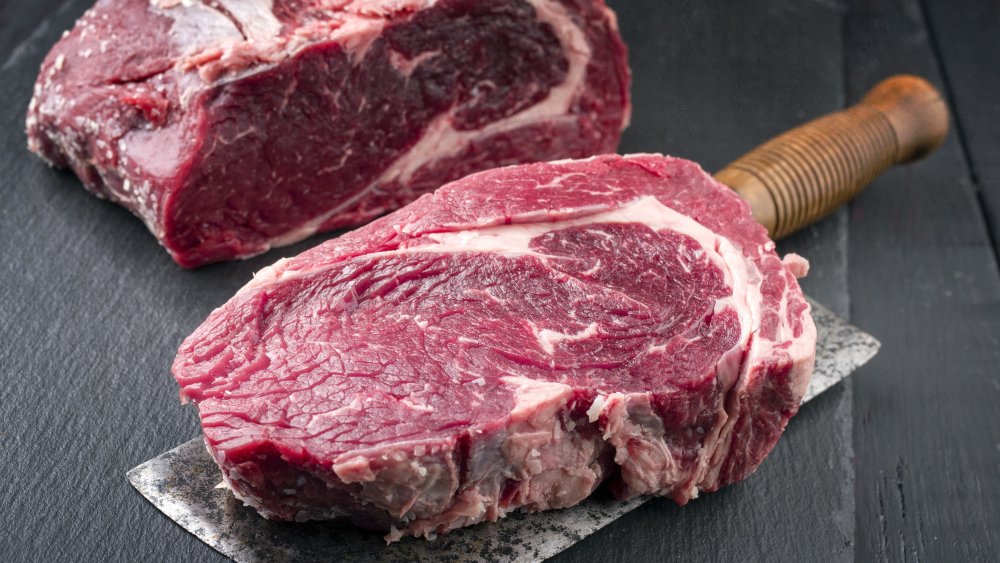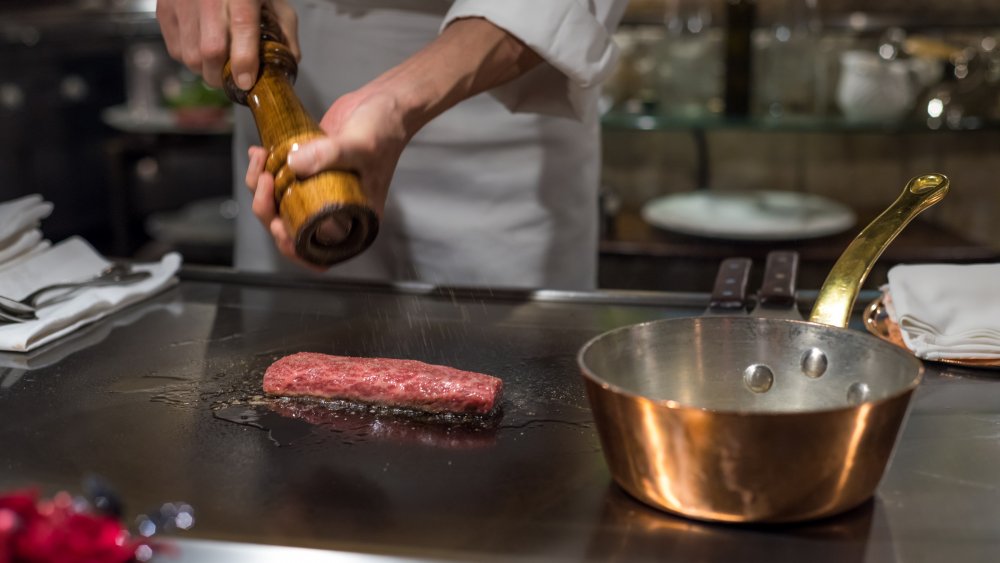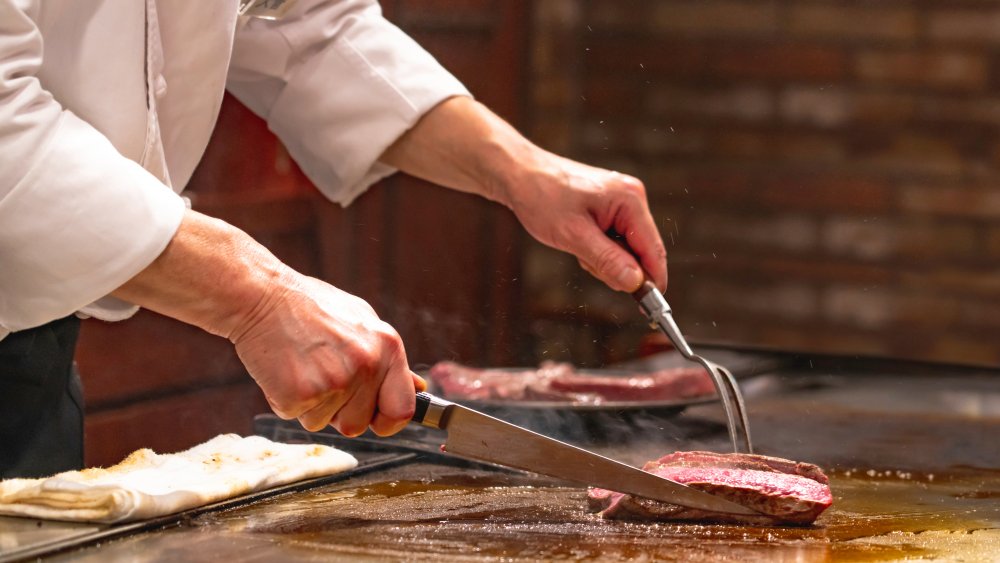You Should Never Order Kobe Beef At An American Steakhouse. Here's Why
Kobe beef is considered a delicacy for its taste, quality, and marbling, but there are actually a few reasons why you should be skeptical if you see it on the menu at the steakhouse you're dining out at. Chances are it's not really Kobe beef.
To understand how restaurants get by with not actually serving real Kobe beef, you first have to know more details about this prized meat. It's a regional style of Wagyu, a Japanese cattle breed, from Kobe in the Hyogo prefecture. It's also the one that gets the most fanfare (other regional Wagyu types include Matsuzaka, Omi, Sendai, Mishima, Hokkaido, and Miyazaki). The Hyogo government houses 12 bulls in a special facility because they are ideal for breeding cattle with perfect marbling. Apparently, all the Kobe beef consumed around the world has been fathered by these bulls.
That may sound like Kobe beef is widely eaten, but actually only half of the cattle, or 3,000 to 4,000 heads, end up qualifying for the esteemed name each year. This is less than what comes out of a midsized cattle ranch in America (via Bon Appétit).
Real Kobe beef is actually very rare
With rules like these, very little Kobe beef actually makes it to the U.S. In fact, only enough to meet the average amount of beef consumed by 77 Americans reaches our country. Since genuine Kobe beef is so rare, the beef's marketing board licenses individual restaurants. As of April 2016, there were only eight restaurants in the U.S. serving certified Kobe beef (via Inside Edition).
So when you're dining out at a steakhouse, the menu may mention Kobe beef, but it's more than likely to not be the real deal. Many restaurants use Kobe beef by name only and actually serve "wangus," a hybrid of Angus and domestically raised Wagyu breeds. However, there are some places that serve beef that doesn't have any sort of Wagyu breeding at all.
This is very misleading, and some restaurants — even renowned and highly rated spots — have been caught in the act. For example, Inside Edition investigated Le Bernardin, leading the three Michelin-starred establishment in New York to change its menu.
Many restaurants don't serve real Kobe beef
During a visit to the esteemed French restaurant, Lisa Guerrero, an investigative correspondent for Inside Edition, ordered a Kobe beef lunch that was priced at $110. But when she asked the manager for Le Bernardin's Kobe beef certification, he apparently couldn't answer. Guerrero asked him to bring the certification outside of the restaurant, but he never came out to meet her.
According to Inside Edition, Guerrero later got a call from the owner who acknowledged that the restaurant had made a mistake. Le Bernardin also promptly changed its menu description from Kobe beef to Japanese Wagyu beef, which is less exclusive (and less expensive) in comparison.
The news source also visited other restaurants in New York and California and found that while Kobe beef is mentioned on menus in the form of steaks, burgers, and hot dogs, none of these places are serving real certified Kobe beef, as verified by the Kobe Beef Association.
Japan cares about the reputation of Kobe beef and is making changes
Why have restaurants been able to misuse the Kobe name? According to Forbes, U.S. restaurants and distributors have had a history of labeling any beef from anywhere in Japan as Kobe. However, what restaurants call Kobe can actually come from many different countries, not just Japan, and have no similarity with genuine Kobe beef — besides being meat from cows.
Fake Kobe beef has been such a rampant problem that DNA testing was introduced last year as a measure to protect the reputation of the luxurious, sought-after meat. Farmers in Japan are now able to bring their live cattle to a meat center. Samples that are certified Kobe beef will be given unique identification numbers and stored for five years. In incidences where beef is suspected of being falsely advertised as Kobe, samples of that meat will be compared with the DNA of the stored samples.
If you're eating out and see Kobe beef on the steak menu, you're probably better off ordering another kind of steak because the Kobe beef is most likely not what you think it is, and you'd be paying a premium price for something less than top quality.



